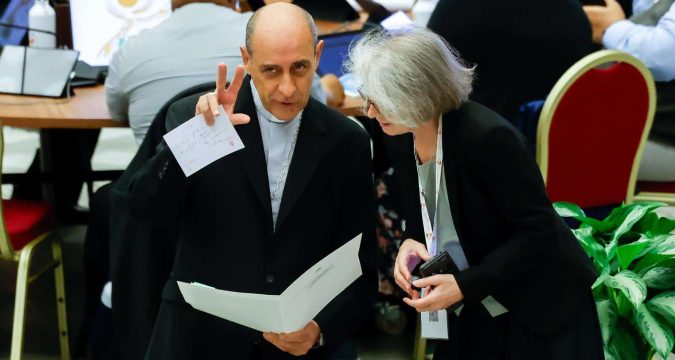
VATICAN (CNS): Pope Francis decided the question of ordaining women deacons was not to be discussed at the 2024 Synod of Bishops, and he directed a synod-related study group on women’s ministries not to explore the matter, according Víctor Manuel Cardinal Fernández, prefect of the Dicastery for the Doctrine of the Faith.
“We know that the Holy Father has expressed that at this time the issue of the female diaconate is not mature and has asked that we not entertain this possibility for now,” Cardinal Fernández told the synod on October 21.
However, he said, the second commission Pope Francis set up in 2020 to study women deacons “will continue to work,” and the “partial conclusions” it has reached “will be published when the time is right.”
But, the cardinal said, “the Holy Father is very concerned about the role of women in the Church and, even before the synod’s request” that the matter be studied, Pope Francis “asked the Dicastery for the Doctrine of the Faith to explore the possibilities of development without focusing on holy orders,” or diaconal ordination.
The dicastery “cannot work in a different direction,” Cardinal Fernández said, adding that he agrees with the pope “because thinking about the diaconate for some women does not solve the issue of the millions of women in the Church,” who serve in hundreds of ways.
…the Holy Father is very concerned about the role of women in the Church and, even before the synod’s request … asked the Dicastery for the Doctrine of the Faith to explore the possibilities of development without focusing on holy orders…
Cardinal Fernández
While most of what is said in the synod hall is considered confidential, the cardinal’s address to the synod was released by the Vatican just days after he apologised to synod members for not attending a meeting to discuss the work of his study group on women’s ministry.
While the cardinal had not promised to attend the October 18 meeting to speak about the study group’s work, about 100 synod participants—cardinals, bishops, priests, religious and laypeople—thought he, or at least members of the group, would be there.
In a message sent to synod members after the meeting, Cardinal Fernández wrote that he had been informed of “the displeasure expressed by some members of the synod” that he was not present.
“I myself am sorry for the misunderstanding,” he said, adding that he had informed the synod on October 9 that he would send two dicastery staff members. However, he offered to meet with synod members on October 24 “to listen to their reflections and receive any written documents from them.”
According to people present at the October 18 meeting, participants had been visibly and vocally upset that the two people Cardinal Fernández sent were not members of the study group and that they did not plan to have a dialogue with participants.
…the cardinal’s address to the synod was released by the Vatican just days after he apologised to synod members for not attending a meeting to discuss the work of his study group on women’s ministry
The meeting, like discussions within the synod itself, was meant to be confidential, so participants who spoke about it asked that their names not be used.
One attendee said the frustration mostly focused on the working group’s methodology and lack of transparency, particularly that the cardinal had not identified any of the members of the group.
Following the first assembly of the synod on synodality in 2023, Pope Francis set up 10 study groups to reflect more deeply on some of the most controversial or complicated questions raised during the synod process, including the question of women’s ministry and decision-making roles in the Church.
In a February letter to Mario Cardinal Grech, general secretary of the synod, Pope Francis said, “It is important that the aforementioned study groups work according to an authentically synodal method,” with dialogue and broad participation.
He asked that the groups make a preliminary report to the synod in 2024 and that they give him their final reports by June 2025.
I am convinced that we can move forward step by step and arrive at very concrete things so that it is understood that there is nothing in women’s nature that prevents them from having very important roles in the leadership of the Churches
Cardinal Fernández
After the leaders of the 10 groups gave brief reports to the synod on October 2, synod members voted to give up one of their few free afternoons to dialogue with the leaders of the study groups and the meetings were scheduled for October 18.
Synod participants signed up in advance for the meetings so that the Vatican could arrange rooms for them to meet. Cardinal Fernández’ group drew the most sign-ups.
Addressing the synod on October 21, the cardinal pointed out that women instituted as catechists can already lead Catholic communities in the absence of a priest, but very few dioceses have taken advantage of the possibility. And only “a small percentage” of the world’s dioceses have instituted women as lectors and acolytes.
He added that many dioceses have not made use of the permanent diaconate even for men and that when they have, “how many times are they just ordained altar boys?”
Cardinal Fernández said, “These couple of examples help us understand that rushing to ask for the ordination of deaconesses is not the most important way to promote women today.”
He said, “I am convinced that we can move forward step by step and arrive at very concrete things so that it is understood that there is nothing in women’s nature that prevents them from having very important roles in the leadership of the Churches. What really is coming from the Holy Spirit cannot be stopped.”








